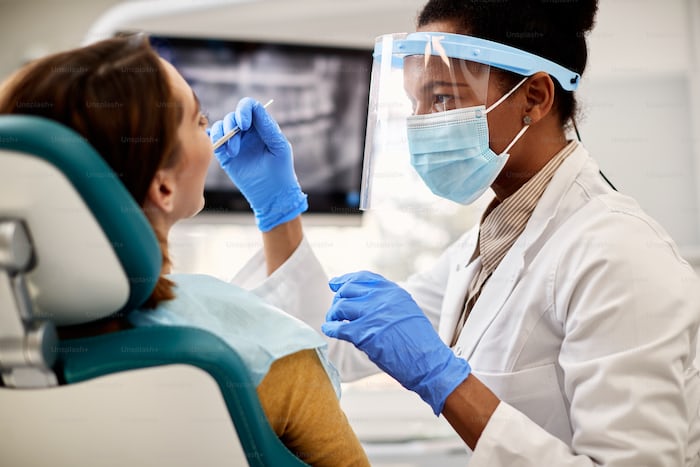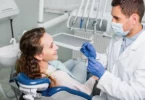We often have many reasons to visit the dentist, from routine checkups to tooth extractions. For some, though, knowing that we must have to make these trips creates a feeling of dread.
Dental anxiety is very common, affecting as many as 1 in 3 people. It can range from mild anxiety about the dentist to a full-blown phobia that prevents you from getting the dental care you need.
Genetics, previous traumatic experiences, social conditioning, stress, and low self-esteem can cause these feelings of anxiety.
For example, a previous traumatic visit to the dentist that caused some damage could make a person skeptical of dental procedures.
Knowing that the dentist will look closely into your mouth might also be uncomfortable. As well it is understandable to be skeptical about undergoing a procedure where you cannot see what is going on and only feel it.
Dental anxiety may manifest in various ways: from getting poor sleep in the days leading up to the appointment to getting sweaty or having difficulty breathing just before a dental procedure. You may even experience an increase in heart rate, visible signs of panic, and crying before undergoing a dental procedure.
Comparing Modern Dental Equipment to Traditional Oral Care Methods
Over time, dental care has evolved by introducing modern dental equipment to make dental procedures more effective and comfortable.
In addition, modern dental equipment ensures that dental processes are carried out more accurately, resulting in fewer complications and better results.
For example, when getting a dental drill, you can use air abrasions instead of traditional drilling methods. Unlike the former, this technique does not generate any heat or pressure. Thus, the structure of the patient’s tooth is preserved, and anesthesia may not be necessary.
Dentists have also begun using a device called an intraoral camera during examinations. This camera produces clear images of the teeth and the supporting structures.
Thus, with this instrument, dentists can better assess their patient’s oral care needs, and the patient can see their dental condition and how a particular dental procedure would remedy the situation. This helps ensure that the dentist accurately estimates the patient’s needs and the likely outcome of the procedure.
Modern dental equipment is also easier to use, making dental procedures quicker and less invasive. This caters to the needs of patients who are nervous about having dental work done.
A notable evolution in this regard is cone-beam computed tomography (CBCT). This imaging receptor is used to conduct scans to help decide where and how dental implants should be placed/positioned. Dentists can also virtually place dental implants before the dental procedure.
Therefore, it eliminates errors that could arise with manual placement and corresponds planning to prosthetic prerequisites. In addition, this method is more advanced, lighter, and easier to use than the regular CT scan, saving time and producing more accurate results.
How Modern Dental Equipment Can Reduce Patient Anxiety
Sometimes, all we need to dispel our fears is some certainty as to what the process is like and what the outcome will be. In this regard, modern dental equipment ensures that dental processes are carried out more accurately, are more comfortable, and are less invasive. As a result, patients can now receive the dental care they need with far less anxiety.
In addition, computer-aided design and computer-aided manufacturing (CAD/CAM) technology has created more comfortable and personalized dental appliances. The CAD/CAM system is built on data acquisition, processing, and digital manufacturing. Data is first acquired through a scan with an intraoral camera. Then, this data is processed with design software, resulting in a data set used to fabricate the prosthesis.
This technology is preferred to traditional procedures because it eliminates human errors arising from manual methods, resulting in the quick and efficient delivery of the dental prosthesis. When procedures are quicker and the results can be anticipated, it reduces the uncertainty that causes patient anxiety.
Also, by using tools such as the Wand to administer anesthesia (instead of a syringe), the patient feels no pain during the procedure and is less averse to subsequent dental activity. All these factors help to eliminate the common causes of patient anxiety: fear of injections, negative experiences from the past, feelings of loss of control, trust issues, and phobias.
Why It’s Time to Replace Old Equipment at Your Clinic
A dentist is only as good as the tools they have at their disposal. Thus, a clinic should be equipped with the tools necessary to give the best care to patients. It is also essential to stay relevant as times evolve. For example, traditional oral care methods are easing out in favor of more comfortable and technologically advanced procedures, which gives patients less anxiety.
High-tech dental equipment has replaced the water jets, handheld instruments, and large dental chairs of the past. As a result, the challenges of tooth extraction, cap replacement, root canal therapy, and other dental procedures are becoming easier to handle, so patients no longer have to bite their nails or experience long periods of anxiety.
To give patients the kind of dental care they need, ensure that your clinic has vacuum systems, air compressors, digital imaging, and equipment rooms. In addition, dentists now use dependable and high-quality dental delivery units and tubing.
The presence of modern equipment in your clinic shows that you are utilizing the best methods to provide patient safety and care as a competent dental practitioner. It also makes your practice stand out from others around it.
Modern dental equipment means eliminating errors that stem from manual processes, and you can give better diagnoses and propose stronger treatment plans for your patients. All this makes your clinic a go-to place for patients who look out for sounder and more comfortable approaches to dental care.
Making Dental Care More Comfortable for Patients
Patients who feel anxiety about oral care should be informed of how avoiding it affects their mental health. Proper dental care can help patients deal with anxiety, low self-esteem, and depression and improve their mental health. It can also help patients feel more comfortable in the dental office and enhance their dental care.
Modern dental equipment has made oral care more accessible and comfortable for patients. So, equipping your practice with modern equipment enables you to alleviate anxiety in patients who find dental procedures uncomfortable or invasive.
As you develop your dental equipment alongside technological advancements, thus resulting in more efficient dental procedures, you can consistently meet the needs of your patients. This will set your clinic apart as one that offers the best patient care available.
AUTHOR’S BIO:
Jessica Coates is a blogger in Toronto. She graduated with honors from the University of British Columbia with a dual degree in Business Administration and Creative Writing. Jessica Coates is a community manager for small businesses across Canada. When not working, she leisurely studies economics,. She writes for Pro North Medical a company that offers the best modern dental equipment.








